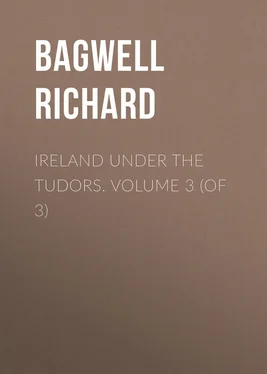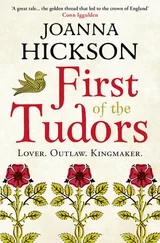Richard Bagwell - Ireland under the Tudors. Volume 3 (of 3)
Здесь есть возможность читать онлайн «Richard Bagwell - Ireland under the Tudors. Volume 3 (of 3)» — ознакомительный отрывок электронной книги совершенно бесплатно, а после прочтения отрывка купить полную версию. В некоторых случаях можно слушать аудио, скачать через торрент в формате fb2 и присутствует краткое содержание. Жанр: foreign_antique, foreign_prose, на английском языке. Описание произведения, (предисловие) а так же отзывы посетителей доступны на портале библиотеки ЛибКат.
- Название:Ireland under the Tudors. Volume 3 (of 3)
- Автор:
- Жанр:
- Год:неизвестен
- ISBN:нет данных
- Рейтинг книги:3 / 5. Голосов: 1
-
Избранное:Добавить в избранное
- Отзывы:
-
Ваша оценка:
- 60
- 1
- 2
- 3
- 4
- 5
Ireland under the Tudors. Volume 3 (of 3): краткое содержание, описание и аннотация
Предлагаем к чтению аннотацию, описание, краткое содержание или предисловие (зависит от того, что написал сам автор книги «Ireland under the Tudors. Volume 3 (of 3)»). Если вы не нашли необходимую информацию о книге — напишите в комментариях, мы постараемся отыскать её.
Ireland under the Tudors. Volume 3 (of 3) — читать онлайн ознакомительный отрывок
Ниже представлен текст книги, разбитый по страницам. Система сохранения места последней прочитанной страницы, позволяет с удобством читать онлайн бесплатно книгу «Ireland under the Tudors. Volume 3 (of 3)», без необходимости каждый раз заново искать на чём Вы остановились. Поставьте закладку, и сможете в любой момент перейти на страницу, на которой закончили чтение.
Интервал:
Закладка:
While Munster waited for its new governor, the Seneschal of Imokilly made two attempts to get possession of Youghal. Just at the beginning of winter, some English soldiers, who were probably unpaid, agreed to open the gates; but the plot was discovered. More than two months later, two goldsmiths, who pretended to be soldiers, were admitted into the town. On the appointed night one kept the guard drinking while the other held a ladder for the assailants, whose plan was to occupy every stone house, and to cut it off from the gates. Fortunately, the soldiers had only a few days before broken down a stair leading from the walls, and thus only a few rebels were able to descend at a time. Two houses were, however, taken, and held for three days, in one of which the seneschal, in cold blood and with his own hands, knocked out the brains of six soldiers. Dermod Magrath, Papal Bishop of Cork and Cloyne, and ‘a very learned man in the papist doctrine,’ was present, and persuaded him not to kill any of the townsmen. The Sovereign, or Burgomaster, Francis Agnes (or Anes), behaved with great gallantry, and on the rumoured approach of troops from Waterford, the seneschal withdrew, having lost some sixty men, but carrying away a great quantity of corn, wine, beef, and hides, and leaving half the town in ashes. Cork was asked to send men to the relief of Youghal, but that city had none to spare, having itself been pressed by the rebels, who came up to the very walls and carried off the linen which was drying on the hedges. One of Ormonde’s first cares was to reinforce the garrison of Youghal. 99 99 St. Leger to Burghley, Oct. 29, 1582, and Jan. 16, 1583; and to Walsingham, Feb. 11.
In order to put down the Munster rebellion, the first thing was to localise it. The Queen herself had suggested that if Desmond could be kept out of Tipperary and Waterford, it would be comparatively easy to deal with him, and this was the plan adopted by Ormonde. At first he fixed his headquarters at Clonmel, whence the woods of Aherlow were easily accessible, and the Seneschal of Imokilly, who lay there, was harassed by the garrisons of Limerick and Kilmallock. In a month after Ormonde’s arrival, Desmond fled to the borders of Kerry, and his adherents began to desert him fast. Patrick Condon and over 300 others received protections, which they showed a disposition to pay for with the heads of their late comrades. The Baron of Lixnaw submitted about the end of March and was followed in a few days by Gerald MacThomas, called Toneboyreagh, who had long kept the county of Limerick disturbed, and now served well against his late associates. About the same time Lady Desmond came to Ormonde under a twenty days’ protection, but as she still demanded life, liberty, and property for her husband, no terms were granted to her. She then surrendered unconditionally, rather than return to such misery as she had lately endured. Early in June the Seneschal of Imokilly also made his submission, and Desmond was thus deprived of his last important supporter. The rebellion was now confined to Kerry and West Cork, and thither Ormonde repaired about the end of June. 100 100 G. Fenton to Burghley, Feb. 24, 1583; Ormonde to the Privy Council, Feb. 28 and April 5; to the Queen, April 24; to the Privy Council and to Burghley and Walsingham, May 28; to the Lords Justices, June 15; to the Queen, June 18; to Walsingham, June 22; Thomas Mynne to Wallop, April 9.
A few days before Ormonde’s arrival Desmond and his wife had a narrow escape from a night attack by the garrison of Kilmallock. The bed in which they had lain was found warm by the soldiers, into whose hands ‘the countess’s gentlewoman’ and others fell. A fog covered the flight of the two principal personages; but cattle, plate, jewels, and wardrobes were all captured. The presence of a lady and her attendants no doubt acted as a clog, and Desmond himself was becoming infirm. The old hurt received at Affane was likely to be aggravated by cold and fatigue, and a month later he had to be carried in his shirt by four men into a bog, and ferried over a river in a trough to escape from a sudden attack by Captain Thornton. After this he fled into Kerry, and it was reported that he would be glad if possible to escape by sea. He was too closely watched for this, but after the failure of his wife’s mission, he still refused to come to Ormonde. The following letter to St. Leger may well be given entire: —
‘Sir Warham, where I understand that the Earl of Ormonde giveth forth that I should submit myself before him as attorney to Her Majesty, you may be sure he doth report more thereof than I have sent him either by word or writing. But this I have offered in hope to prove the unreasonable wrong and injuries done unto me by her Highness’s officers in this realm from time to time, unguilty in me behalf as God knoweth. I am contented upon these conditions so as me country, castles, possessions, and lands, with me son, might be put and left in the hands and quiet possession of me counsel and followers, and also me religion and conscience not barred, with a pardon, protection, and passport for me own body to pass and repass. I would have gone before her Majesty to try all those causes just and true on me part, as I still do allege if I might be heard or may have indifference, and likewise hoping that I might have more justice, favour, and grace at her Majesty’s hands when I am before herself than here at the hands of such of her cruel officers as have me wrongfully proclaimed, and so thereby thinking that her Majesty and I may agree; if not that I may be put safe in the hands of me followers again, and I to deliver me son and me said possessions back to her Majesty’s officers. Dated at Feale the 28th of April, 1583. – Gerot Desmond.’
Ormonde would hear of nothing but an unconditional surrender, and continued to ply his double policy of war and clemency. Before the end of May he could announce that 134 had been slain, and 247 protected, since those last mentioned. The few remaining rebels were reduced to horseflesh or carrion, and Desmond himself knew not where to lay his head. He had still eighty men with him, but his pride was sufficiently humbled to make him address Ormonde directly. He could not, he said, accuse himself of disloyalty, but confessed that he had been misled, and pleaded that he had been tyrannously used. He begged for a conference, ‘humbly craving that you will please to appoint some place and time where I may attend upon your honour.’ Ormonde, who was justly proud at this falsification of St. Leger’s prediction, would not alter his terms, and a few days afterwards reported that the rebel’s eighty followers were reduced to twenty. A little later, when he was himself marching towards Kerry, he learned that the fugitive’s retinue consisted of only five persons – a priest, two horsemen, one kerne, and a boy. The people of the South-West had already experience enough of an invasion by Ormonde, and hastened on all sides to make terms for themselves. There were rumours that the Queen was getting tired of the war, and that he would be recalled. He was, he said, so confident of success that he was ready to begin the reduction of the forces under his command. Success was very near when he had been removed before, and he begged that the mistake might not be repeated. ‘Thus,’ he said, ‘am I handled, and do break the ice for others to pass with ease.’ 101 101 G. Fenton to Walsingham, Jan. 16; St. Leger to Walsingham, Feb. 11; Sir W. Stanley to Fenton, May 25; Desmond to Ormonde, June 5; Ormonde to Burghley and to the Queen, June 18; to Burghley, June 22.
Интервал:
Закладка:
Похожие книги на «Ireland under the Tudors. Volume 3 (of 3)»
Представляем Вашему вниманию похожие книги на «Ireland under the Tudors. Volume 3 (of 3)» списком для выбора. Мы отобрали схожую по названию и смыслу литературу в надежде предоставить читателям больше вариантов отыскать новые, интересные, ещё непрочитанные произведения.
Обсуждение, отзывы о книге «Ireland under the Tudors. Volume 3 (of 3)» и просто собственные мнения читателей. Оставьте ваши комментарии, напишите, что Вы думаете о произведении, его смысле или главных героях. Укажите что конкретно понравилось, а что нет, и почему Вы так считаете.












